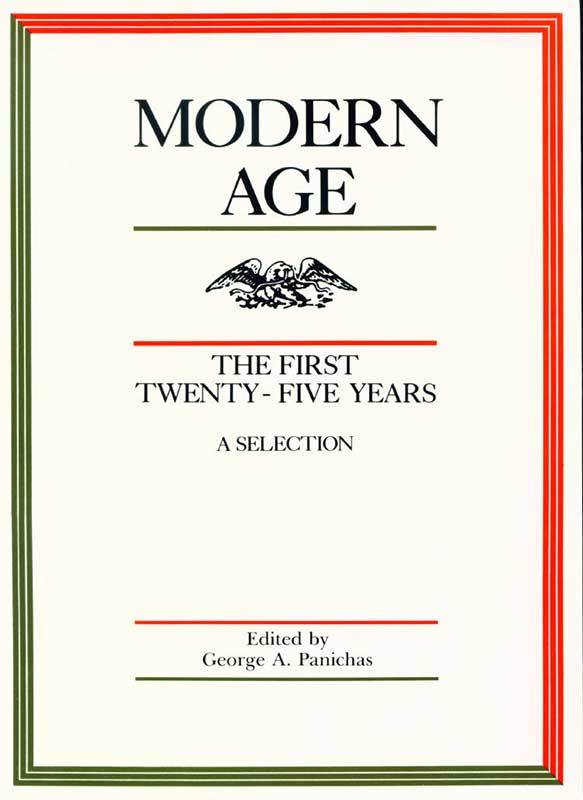Political Thought
Our titles in political thought encompass the ideals of the classical liberal tradition, such as self-government, the rule of law, and constitutional guarantees of freedom of religion and of the press. The collection includes foundational writings from such thinkers as John Locke, David Hume, Bernard Mandeville, and Alexis de Tocqueville, as well as twentieth-century perspectives from writers like Michael Oakeshott and Bertrand de Jouvenel. These titles represent thinkers from different times and contexts, offering the reader a variety of texts that have helped shape the ideas of liberty in today’s society.
Download Catalog-
Modern Age: The First Twenty-Five Years
by George A. Panichas
/ Learn MoreThese seventy-eight essays characterize the richness and diversity of conservative scholarship. Modern Age was founded in 1957 by Russell Kirk, with Henry Regnery and David S. Collier. The magazine is now published by the Intercollegiate Studies Institute. George A. Panichas is the current editor of Modern Age and a Professor of English at the University of Maryland.
-
The Moral Foundation of Democracy
by John H. Hallowell
/ Learn MoreWith The Moral Foundation of Democracy, John H. Hallowell makes a significant argument in favor of the importance of moral values in the orderly functioning of modern democracies. Hallowell argues that developments in recent democratic thought have eroded the very “faith” upon which democracy rests, namely, that man is a reasonable, moral, and spiritual actor. He sharply criticizes positivist thought…
-
The Morals of Markets and Related Essays
by H. B. Acton
/ Learn MoreAlthough the market economy is not as unpopular now as when Acton wrote The Morals of Markets, the morality of buying and selling has long bothered man’s conscience. Defenses of capitalism often establish its efficiency or rely on a “that is the way human nature is anyway” argument. This book asserts that a free market is a necessary condition for…
-
My Thoughts
by Charles-Louis de Secondat Montesquieu
/ Learn MoreMy Thoughts provides a unique window into the mind of one of the undisputed pioneers of modern thought, the author of the 1748 classic, The Spirit of the Laws. From the publication in 1721 of his first masterpiece, Persian Letters, until his death in 1755, Montesquieu maintained notebooks in which he wrote and dictated ideas on a wide variety of…
-
New Individualist Review
by Milton Friedman
/ Learn MoreInitially sponsored by the University of Chicago Chapter of the Intercollegiate Society of Individualists, the New Individualist Review was more than the usual “campus magazine.” It declared itself “founded in a commitment to human liberty.” Between 1961 and 1968, seventeen issues were published which attracted a national audience of readers. Its contributors spanned the libertarian-conservative spectrum, from F. A. Hayek…
-
On Executive Power in Great States
by Jacques Necker
/ Learn MoreJacques Necker (1732–1804) was a Swiss statesman and financier who played a crucial role in French political life from 1776 to 1789. Born in Geneva, he was a devout Protestant who amassed considerable wealth as a successful banker. In October 1776, he was appointed as director of the Royal Treasury and, later, in June 1777, as director general of finances…
-
On History and Other Essays
by Michael Oakeshott
/ Learn MoreIn five essays, including three on historiography, one of the greatest minds in English political thought in the twentieth century explores themes central to the human experience: the nature of history, the rule of law, and the quest for power that is intrinsic to the human condition. Michael Oakeshott believed, as Timothy Fuller observes, that “the historian’s effort to understand…
-
On Liberty, Society, and Politics
by William Graham Sumner
/ Learn MoreWilliam Graham Sumner is the “forgotten man” of American intellectual history. Too often dismissed or only superficially understood, his interpretations are now attracting closer scrutiny and appreciation. He is remembered chiefly as one of the founding fathers of sociology. Sumner’s analysis of the relation between the individual and society is deeper and more sophisticated than is commonly thought. For students…
-
On Power
by Bertrand de Jouvenel
/ Learn MoreDocumenting the process by which government and controlling majorities have grown increasingly powerful and tyrannical, Bertrand de Jouvenel demonstrates how democracies have failed to limit the powers of government. Jouvenel traces this development to the days of royal absolutism, which established large administrative bureaucracies and thus laid the foundation of the modern omnipotent state. Bertrand de Jouvenel was an author…
-
On Religion
by Benjamin Constant
/ Learn MoreThis is the first full-length English translation of Benjamin Constant’s massive study of humanity’s religious forms and development, published in five volumes between 1824 and 1831. Constant (1767–1830) regarded On Religion, worked on over the course of many years, as perhaps his most important philosophical work. He called it “the only interest, the only consolation of my life,” and “the…
-
The Origin and Principles of the American Revolution, Compared with the Origin and Principles of the French Revolution
by Friedrich Gentz
/ Learn MoreThe Origin and Principles of the American Revolution is perhaps one of the most important books written on the American Revolution by a European author. It is an original study of the subject by a conservative, objective German observer who acknowledges the legitimacy of the American Revolution, but also asserts at the same time that it was not a revolution…
-
The Pacificus-Helvidius Debates of 1793–1794
by Alexander Hamilton and James Madison
/ Learn MoreThe Pacificus-Helvidius Debates of 1793–1794 matched Hamilton and Madison in the first chapter of an enduring discussion about the proper roles of executive and legislative branches in the conduct of American foreign policy. Ignited by President Washington’s Neutrality Proclamation of 1793, which annulled the eleventh article of America’s treaty with France of 1778, the debate addressed whether Washington had the…
35% OFF YOUR ENTIRE BOOK PURCHASE
With promo code:
SPRING2024
Expires June 30, 2024












